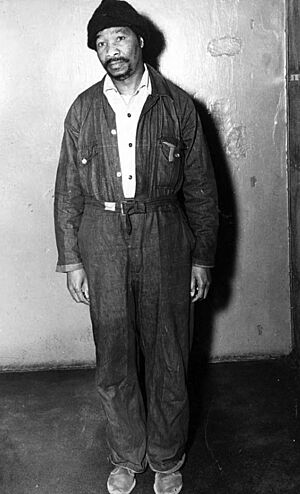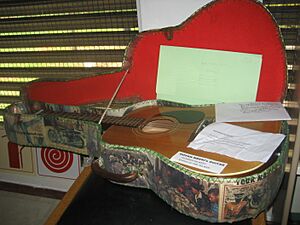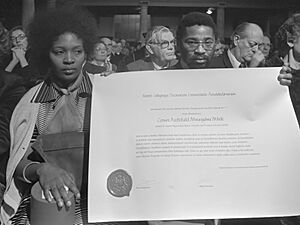Govan Mbeki facts for kids
Quick facts for kids
Govan Mbeki
|
|
|---|---|

Under arrest in 1963
|
|
| Co-Deputy Chairperson of National Council of Provinces *alongside Bulelani Ngcuka |
|
| In office 1997–1999 |
|
| Preceded by | position established |
| Succeeded by | Naledi Pandor |
| Deputy President of Senate of South Africa | |
| In office 1994–1997 |
|
| Preceded by | position established |
| Succeeded by | position renamed |
| Secretary of MK | |
| In office 1961–1963 |
|
| Preceded by | position established |
| Succeeded by | position abolished |
| Personal details | |
| Born |
Govan Archibald Mvunyelwa Mbeki
9 July 1910 Mpukane Location, Nqamakwe district, Union of South Africa |
| Died | 30 August 2001 (aged 91) Port Elizabeth, Eastern Cape, Republic of South Africa |
| Political party | African National Congress South African Communist Party |
| Spouse |
Epainette Mbeki
(m. 1940) |
| Children | Linda Mbeki (daughter; born 1941, died 2003) Thabo Mbeki (son; born 1942) Moeletsi Mbeki (son; born 1945) Jama Mbeki (son; born 1948, died 1982) |
| Occupation | anti-apartheid activist |
Govan Archibald Mvunyelwa Mbeki (born 9 July 1910 – died 30 August 2001) was an important South African leader. He fought against apartheid, which was a system of unfair laws that separated people by race. He was a key member of the African National Congress (ANC) and also a leader in the South African Communist Party.
Govan Mbeki was the father of Thabo Mbeki, who later became the president of South Africa. He was also a leader of Umkhonto we Sizwe (MK), which was the armed group of the ANC. Because of his fight against apartheid, he was put in prison for a long time (from 1963 to 1987). He was imprisoned with other famous leaders like Nelson Mandela. People sometimes called him by his nickname, "Oom Gov".
Contents
Early Life and Education
Govan Mbeki was born in a place called Nqamakwe in the Transkei region. He belonged to the Xhosa ethnic group. When he was a teenager, he worked as a newsboy and messenger in cities. This job showed him how much poverty black Africans faced in the cities and how often the police bothered them.
He went to Fort Hare University and finished his studies in 1936. He earned a degree in politics and psychology and also got a teaching diploma. At the university, he met other future leaders who were also fighting for freedom in Africa.
Teacher, Writer, and Activist
Govan Mbeki worked as a teacher for some time. However, he often lost his job because of his political activities. He joined the African National Congress (ANC) in 1935. He also became a member of the South African Communist Party (SACP) in the late 1930s. This party believed in sharing wealth and power more equally among all people.
After losing his teaching job, he started a co-operative store in Idutywa. He also began a career in writing. From 1938 to 1944, he was the editor of a magazine called Territorial Magazine / Inkundla Ya Bantu.
In 1944, Mbeki stopped working as a journalist. He became a member of the Transkei Territorial Authorities General Council until 1950. He called this council a 'toy telephone' because he felt that even if people spoke their minds, their words had no real power to change things.
When the SACP was banned by the apartheid government in 1950, Mbeki continued his work with the African National Congress. In 1952, he was put in prison for three months. This was because he took part in the 'Defiance Campaign', which was a protest against unfair apartheid laws.
Later, in 1954, a tornado destroyed his store. He also lost his teaching job again. Mbeki then moved to Port Elizabeth. There, he joined the team that wrote for New Age, a well-known newspaper that supported the fight against apartheid. He made sure the newspaper shared the stories and hopes of black working-class people, especially those in the countryside.
He also worked on other publications like Guardian, Fighting Talk, and Liberation. He was very active in important campaigns of the time, including the Defiance Campaign and the Congress of the People.
Fighting for Freedom and Imprisonment
In 1960, the ANC was banned by the government. To continue the fight, the ANC and the SACP secretly formed Umkhonto we Sizwe (MK). This group became the armed part of the ANC. Govan Mbeki was deeply involved in setting up MK.
In November 1962, the government banned New Age newspaper. When the writers started a new paper called Spark, the government banned the writers themselves, including Mbeki. This stopped his work as an editor and journalist in the country.
On 11 July 1963, Govan Mbeki was arrested with other MK leaders. In 1964, he was part of a famous court case called the Rivonia Trial. He was found guilty of trying to overthrow the government and was sent to Robben Island prison. He spent 24 years there.
Books and Writings
In 1939, Govan Mbeki published his first book, Transkei in the Making. He also wrote a very important book called South Africa: The Peasants' Revolt in 1958, which was published in 1964. This book looked closely at the political and economic situation in the Transkei region.
While he was in prison on Robben Island, Mbeki taught classes to other prisoners. He taught them about different ideas, including Marxist theory. He also wrote many important analyses while in jail. These writings were kept on the island and used for discussions among the prisoners. The copies that survived have since been published as books.
After his release, he published The Struggle For Liberation in South Africa: A Short History in 1992. In 1996, he published another book called Sunset at Midday: Latshonilangemini!.
Release from Prison and Later Life
Govan Mbeki was released from Robben Island prison on 5 November 1987, after serving 24 years. After apartheid ended, he played a role in South Africa's new government. He served in the Senate from 1994 to 1997 as its Deputy President. Then, he served in the National Council of Provinces from 1997 to 1999.
Mbeki passed away in Port Elizabeth on 30 August 2001. He was given a special state funeral on 8 September 2001, during his son Thabo's time as president.
Awards and Honours
Govan Mbeki received an honorary doctorate degree from the University of Amsterdam in 1978. His son Moeletsi attended the ceremony because Govan Mbeki was still in prison at the time.
On 26 June 1980, the African National Congress gave Mbeki the Isitwalandwe Medal. This is the ANC's highest honour. Mbeki could not receive the award in person because he was still in prison on Robben Island.
Many places and awards have been named after Govan Mbeki to honour his contributions.
- The Govan Mbeki Local Municipality in Mpumulanga is named after him.
- The Govan Mbeki Health Building at Glasgow Caledonian University in Scotland was named in his honour in 2001. His son Thabo attended the opening ceremony.
- He received the Order for Meritorious Service in gold in 2003.
- In 2004, he was voted 97th in the Great South Africans list.
- In 2013, a large road in Cape Town was renamed Govan Mbeki Road.
See also
- Prisons in South Africa
- Maximum Security Prison, Robben Island
 | Leon Lynch |
 | Milton P. Webster |
 | Ferdinand Smith |



